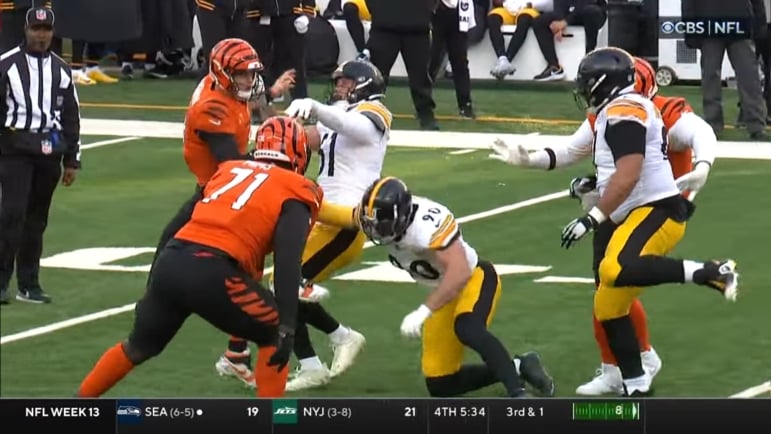Player: OLB Nick Herbig
Stock Value: Up
Reasoning: Still proving himself to be a young stud, Nick Herbig continues to make key plays. For the second consecutive week, he recorded a strip-sack, this one being returned for a touchdown. Despite playing in just eight games, he now has 4.5 sacks and four forced fumbles. By the way, the only player with more forced fumbles than Herbig? T.J. Watt.
At this point, T.J. Watt and Nick Herbig are just competing for strip-sacks. They are racking them up over the past year or so, and both notched one yesterday. For Herbig, it marked his second in as many weeks, both in divisional games. In Week 12, his sack/forced fumble of Jameis Winston led to the Steelers taking the lead.
The Steelers were unable to hold that lead, but they held the lead he helped provide yesterday. This time, the defense needed no assistance. After Nick Herbig chased Joe Burrow down, Payton Wilson scooped up the loose ball and ran it in for a touchdown.
In 288 snaps this season, Herbig has 4.5 sacks, 4 forced fumbles, 17 tackles, and 4 tackles for loss. The Steelers haven’t used him a ton in coverage, but he has had to play the run more lately. For portions of the season, he has had to start in place of Alex Highsmith while the latter is injured.
That includes the past three games, during which he has two sacks and three forced fumbles, all against divisional opponents. It seems as though the Steelers brought Nick Herbig back from his injury at just the right time. He managed to hit the ground running, making an immediate impact and then continuing to do so.
With Highsmith likely back for the Steelers’ next game, they will have to figure out how to keep Herbig contributing. I suspect we will see some three-OLB packages, which they have already dabbled in. Given the pass-rushing issues they have had at times this year, that wouldn’t be a bad idea.
As the season progresses, Steelers players’ stocks rise and fall. The nature of the evaluation differs with the time of year, with in-season considerations being more often short-term. Considerations in the offseason often have broader implications, particularly when players lose their jobs, or the team signs someone. This time of year is full of transactions, whether minor or major.
A bad game, a new contract, an injury, a promotion—any number of things affect a player’s value. Think of it as a stock on the market, based on speculation. You’ll feel better about a player after a good game, or worse after a bad one. Some stock updates are minor, while others are likely to be quite drastic, so bear in mind the degree. I’ll do my best to explain the nature of that in the reasoning section of each column.






